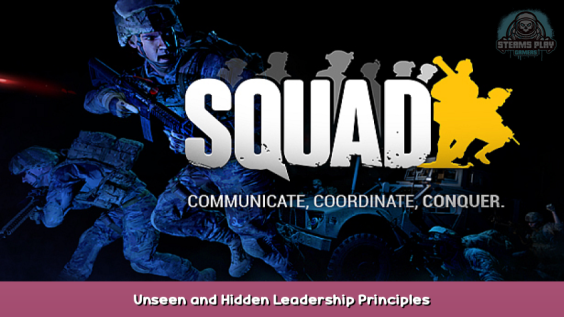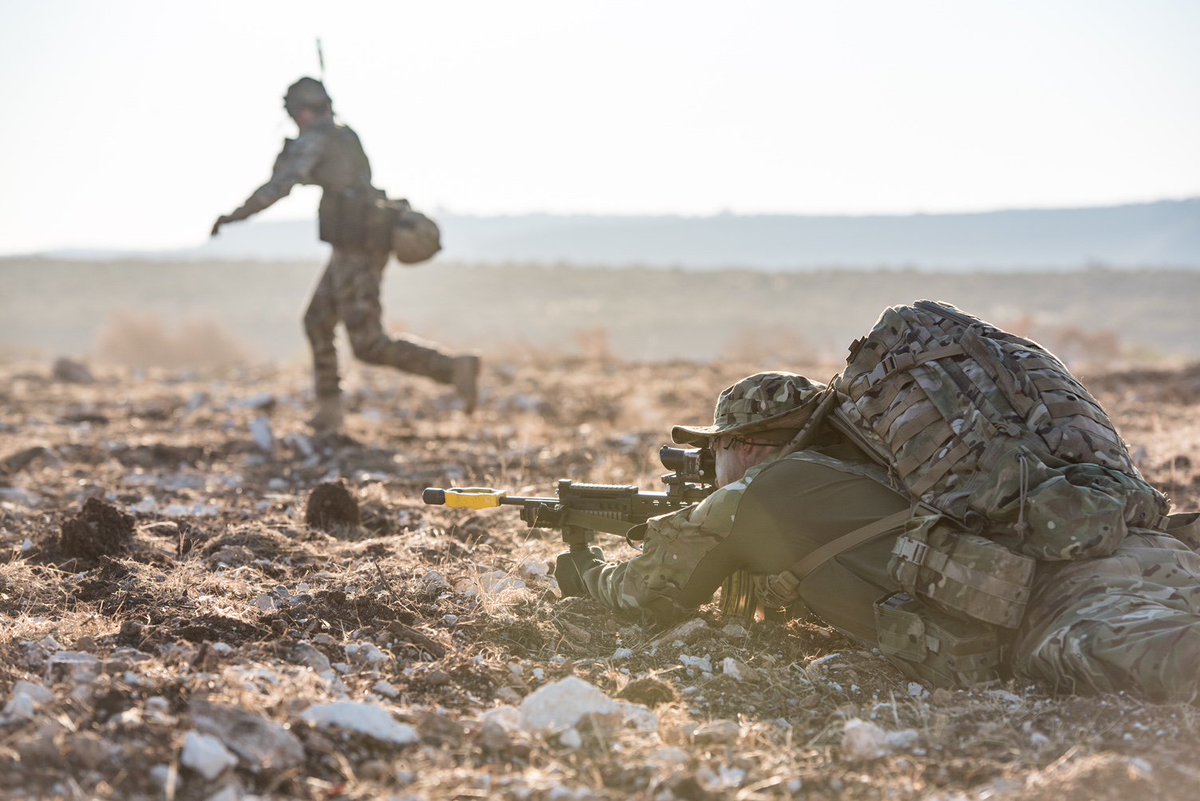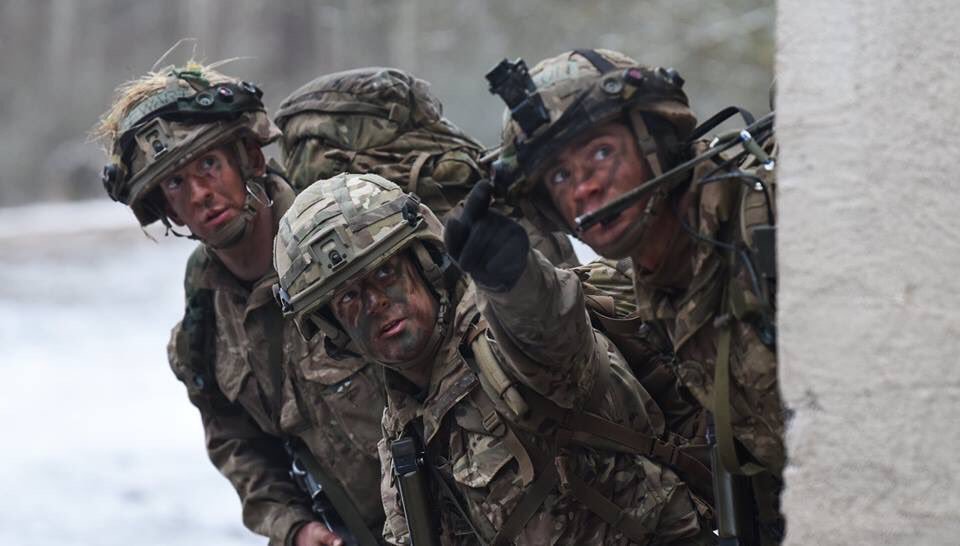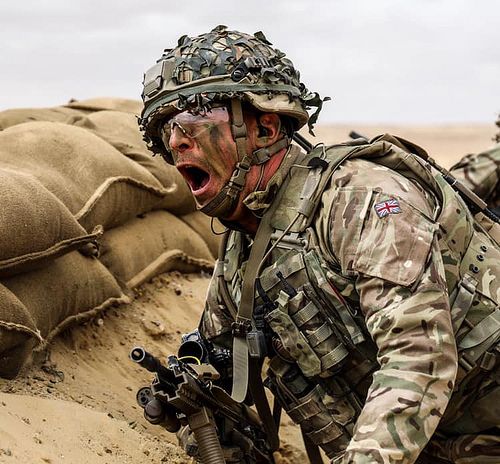
There is a psychological and emotional aspect to leadership that I see commonly neglected by those who start squad leading, as well as those who are already squad leading that could turn your leadership from being ‘okay’ to great and the experience from being ‘burdensome’ to fulfilling.
After many hours on project reality, probably 1000+ squad leading and the hours I have on Squad now, making this understanding routine has made squad leading extremely effectively an [almost] autopilot experience.
With many squad members I’ve led commending me for experiencing some of the principles mentioned.
These Principles are not as easily recognised as physical tactics and procedures, however, I would argue they are in fact more important from a leadership perspective because they maximise every individuals ability to be cohesively autonomous in a squad and therefore gives you a better in-game experience due to less micro-management, more effective and inspired squad mates and a squad-wide clarity of purpose and objective.
These Principles will Inspire your newly formed squad to:
- Adopt a war-fighter mentality
- Execute anything with robust character and intent
- Respect and follow you
- Grow a sense of autonomy within the squad
- Engage with professionalism
From the staging phase to the end of the round.
Personal Leadership – Inspire Respect
All leadership starts with yourself, and if you can’t lead yourself, you’ll find it hard to lead others
Extreme Ownership
Your squad mates will follow you psychologically and emotionally before they follow you physically. And an important part of leadership is to take ownership of all things. The authority you gain from creating a squad and having strangers follow you doesn’t come from the creation of the squad. It comes from the responsibility you take on from them thereafter.
When you take ownership of everything, everything becomes your fault, and you gain ‘power’ as a leader within the squad and over the situation through it. Accountability is an important aspect to gaining respect, and the people who notice it will grow in respect for you and apply it for themselves.
If the AT misses a shot and the squad dies – it’s your fault.
You could have had someone else choose AT, you could’ve avoided the armoured vehicle, you could’ve… etc.
If the medics aren’t reviving people – it’s your fault
You could’ve reminded them, you could’ve replaced them, you could’ve made sure they’re the last ones to take contact etc.
If someone refuses to listen to you and it ends up jeopardising the squad- it’s your fault
You could’ve explained the reason why you tell them to do something, you could’ve stressed its importance, you could’ve kicked them.
As a leader, it’s always your fault. And once you understand and apply this, people will more readily follow your command.
Setting A Standard
Your squad mates will only be able to potentially perform at the standard you perform at. Nothing higher. You set the ceiling.
Psychologically, the leadership masculine archetype of a ‘king’ is given to people who’ve been accepted as leadership. This is intuitively receptive to every individual, everyone has it, but not everyone embodies it. When someone embodies it, everyone recognises it and projects their ‘ideal’ self onto that leader – ‘the king’.
So as a leader, psychologically, your squad mates will follow you enthusiastically if you set a high enough standard within the squad for everyone to follow, whilst also meeting what is expected.
Therefore:
- Their maximum enthusiasm is your minimum enthusiasm
- Their maximum level of professionalism is your minimum level of professionalism
- Their maximum standard of execution is your minimum standard of execution
- Their maximum level of respect is your minimum level to respect them
- Their maximum level of assertiveness is your minimum level of assertiveness
- Their maximum level of communication quality is your minimum level of communication quality
A person who lacks humility cannot be a good leader
This may not be ‘unseen’ but the proper method of execution of ‘humility’ is unseen.
Humility does not mean being passive, it means being able to accept your limitations and acting accordingly.
As a squad leader, you are subordinate to your commander who is an asset that has strategic insight you do not have.
You therefore must subdue your own ego, and in turn you’ll find a growth in respect from your subordinates when they notice you are also a good follower. Many a time, I’ve mentioned “The commander wants us to fallback and defend”, with hearty acknowledgements of the order followed by swift action.
Squad mates also make suggestions, and linking back to setting a standard, if you respect and consider their suggestions they will also respect your commands once they’ve heard why your way is the best way to go. They don’t necessarily need you to listen to them, they just want to feel confident in your thinking
Continuing on, you may come across a more confident, and well performing squad mate in your squad that is assertive or direct. This is nothing to be intimidated about or contest and minimise. If you notice they’re useful, you acknowledge it by giving them more responsibility and showing them you acknowledge it by trusting them. This will usually lead to a ‘NCO’ type figure that helps you rally the rest of the squad because they now also develop the urgency to fulfil their now shared and respected but subordinate role of responsibility in the squad.
However, if they fail to perform and become a detriment to the squad, you minimise the responsibility of course.
Squad Management/Leadership – Make them formidable
“There are no bad teams, only bad leaders”
Very often squad leaders wish to project their idealised version of a squad onto their squad, rather than managing their squad as their squad is. This makes them fail as leaders, as they fail to properly handle their squad in correct estimation of their strengths and weaknesses.
Whereas if they properly estimated their squads’ strengths and capabilities, they would be a more effective set of 9 for the team.
Don’t make them something they are not, make them the best of what they already are.
On an interpersonal level, this means within the first 10 minutes of the round including the staging phase, albeit a small amount of time, you will have to quickly take inventory of the personalities within your squad.
- Find out if anyone is new
- Potentially good fire-team leaders
- Who is communicative
- Gauge their level of cooperation
- Who doesn’t meet your standard/should be kicked
Once you’ve collected this type of information you can now start exercising and refining your idea of your squads abilities as your round progresses. The quicker and more refined your evaluation, the better and earlier you can make your squad perform optimally.
Structuring Engagements and the Squad
In any following capacity, followers enjoy taking on their tasks and objectives more when they have structure. As a leader, part of your responsibility is to maintain a good amount of order out of chaos. This sense of order is both mental, and physical.
Firstly, a good way to do this is to plan contingencies where you can. This will inspire confidence and a sense of reliability from your squad members.
Other ways to also inspire confidence and reliability is not to panic, stay clear, coherent and succinct in communication and feign confidence if you need to during dire situations. e.g.
There have been many rounds where 1 or 2 people within my squad became defeatist, and my fight for the rest of the round was against the defeatist attitude. The feigned confidence ended up maintaining the performance and enthusiasm in the squad just enough for my squad to turn the game around and win.
Furthermore, what I tend to do is declare each offensive/defensive plan with assertiveness using the simple SMEAC acronym:
1. Situation – “Squad 2 is taking the back-cap, 3 is stalling them at the front and we’ll secure the centre points at Kropy to stop any helicopter rushes”
2. Mission – “We’ll capture and hold Kropy until the back-caps are captured, ready to react to push forward or fall-back to support otherwise”
3. Execution – “We’ll be inserting by helicopter to the southwest. Assault fireteam A will move to capture and hold as anchor, whilst Support fireteam B builds the HAB then regroups”.
4. Any Questions – “Any Questions”
5. Check for Understanding – “Fireteam Alpha is the assault team, Fireteam Bravo is Support, first mission is Kropy”.
Interpersonal Relations At An Arms Reach
This is an important and very often neglected part of squad management taken from The Dichotomy of Leadership by Jocko Willink. The attitudes in the squad have a subtle balance that seemingly act as a dichotomy.
Where if you are too personally involved with the squad, you’ll inspire complacency. Whereas if you are too impersonal with the squad, you’ll lose the ability to organically motivate your squad members and lose a grip on managing their morale as there is no rapport/bridge to give it through.
It therefore becomes a careful balancing act where it’s important to keep an arms reach from the rest of your squad members relative to their personal interactions. This is why a common leadership personality tends to be a bit more reserved than the loudest member, or a bit more energetic than the quietest member.
Sell the victory before they work for it
Everyone has the mind of a warrior, whether it’s in real-life or in a video game. We all have it in our minds, it’s just a matter of getting it out.
As a leader, emotional and psychological leadership is just as – if not more important than the management and tactics aspect of leading a squad.
As a leader you have to help them get the warrior out of them. If you’ve ever done any sort of sales, you’ll understand how to motivate people to do things, if not I’ll explain below:
We make decisions based on emotions, not logic. If something seems like a logic based decision, the logic was used to give us the emotional sense of security to solve an emotionally inducing problem.
Although everyone is behind a screen, this is still human interaction. So emotion is very much at play, yet still this important and hidden aspect of leadership is very frequently missed out.
A sure-good way to motivate is to maintain the result in mind for your squad members, this stimulates emotion [ie]:
- “[We’re going to make this round ours, and be the best squad out of both teams!] We’ll do this by…”
- “[I’m going to put as much effort as I can to make sure you guys have a good experience of destroying the enemy]“
- “[We’re going to defend this point, and be what our team needs!]“
- “[AT! Shred that BMP, let’s teach them they’ll need to send their whole team to take this from us!”]
- “[Set up security around me, we’re going to own this forest until supplies arrive!]“
- “[AT! Find that Tank and tell it to **** off!]
- “[Support Team, I want to hear a hail of gunfire heading east. Give it to em]“
- “[They’ll need to send artillery for this point, otherwise they can **** off]“
- “Assault team, flank right and [ruin their day!]”
It can come across as tacky, but said in the right moment will put your squad members into the experience and get them performing well autonomously.
Use it sparingly.
I hope you found this to be useful. But these are the hidden/unseen leadership principles, with some that you’ll know but may not understand the importance of. After many hours on project reality, probably 1000+ squad leading and the hours I have on Squad now, making this understanding routine has made squad leading effectively an [almost] autopilot experience.
This is all for Squad Unseen and Hidden Leadership Principles hope you enjoy the post. If you believe we forget or we should update the post please let us know via comment, we will try our best to fix how fast is possible! Have a great day!
- Check All Squad Posts List






Leave a Reply